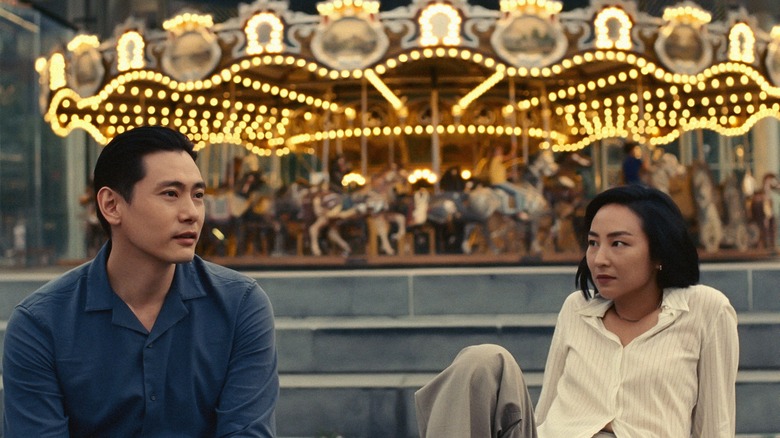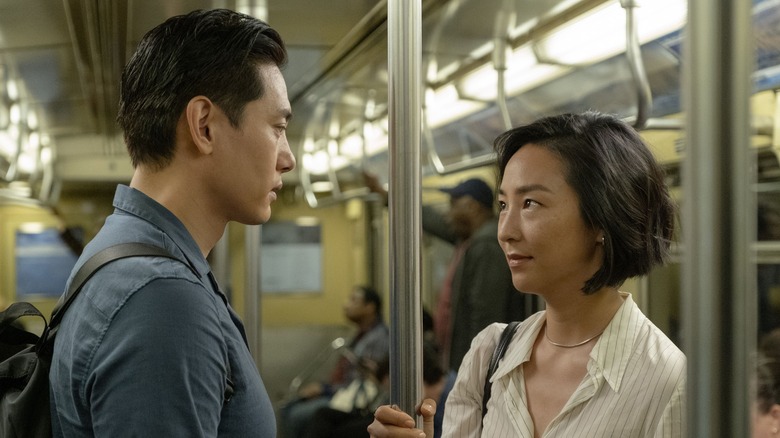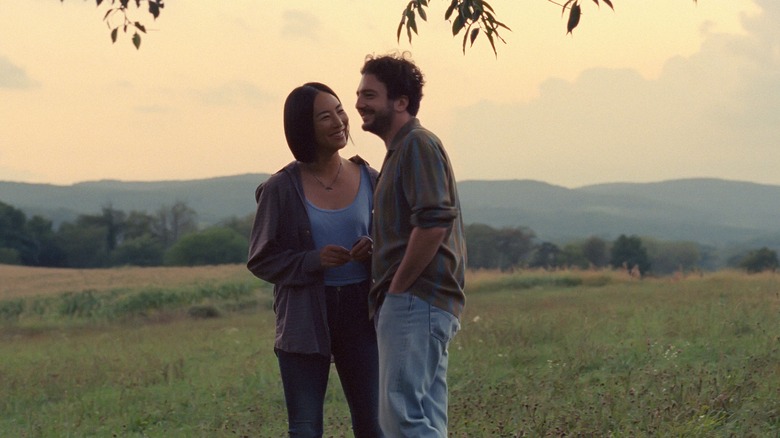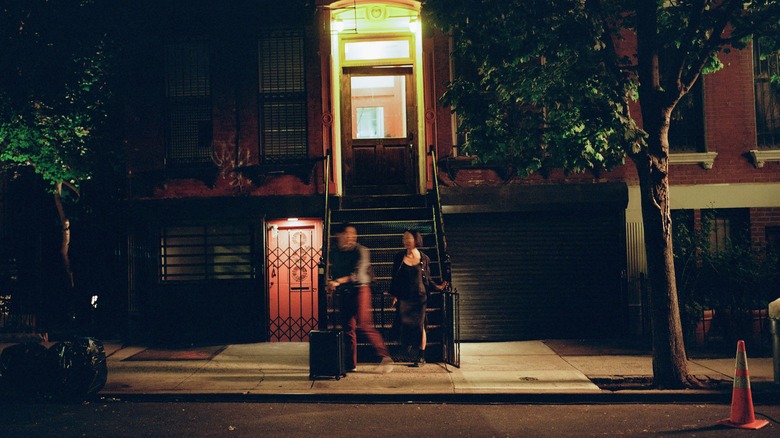Past Lives Ending Explained: Saying So Much With So Little
If you ask people what their favorite movie endings are, they will most likely tell you an ending that has some sort of big twist, a big set piece, or a major display of emotional catharsis, be it the two lovers deciding to be together or them opting for a painful, tear-filled goodbye. However, sometimes it is the quietest endings that can be the most impactful, where restraint is the only way to properly convey what the filmmaker wants to get across. One of my favorite endings of all time — William Wyler's "Roman Holiday" — uses this tactic to perfection. It sets up with nearly two hours of a buoyant, lovely romance between Audrey Hepburn and Gregory Peck, and in the final scene, their separation cannot be addressed in the public forum in which it is set, meaning their bittersweet parting can only de done through glances and innuendo.
If you are looking at the films of 2023 and the endings that soar in regards to the things not said, one stands head and shoulders above the rest: Celine Song's directorial debut "Past Lives." In many ways, the success of this relationship drama hinges on whether or not it nails this incredibly tense yet quiet final moments between its central characters. Let's dig into those last few minutes of the film and see both how emotionally impactful the conclusion is in the moment as well as how you can extrapolate so much from so little happening.
What you need to remember about the plot of Past Lives
The central relationship at the heart of "Past Lives" is between Nora, born Na Young (Greta Lee, "Russian Doll"), and Hae Sung (Teo Yoo, "Love to Hate You"). The two were childhood best friends growing up in South Korea, and in their preteen years, there was clearly some kind of attraction happening between the two, even if they didn't fully understand it. but the idea of them continuing to see the evolution of those feelings gets kneecapped when Nora's family abruptly moves to Canada, effectively ending their friendship.
A dozen years pass, and Nora has moved to New York to study playwriting. Meanwhile, Hae Sung has recently returned from military service and has begun a relationship with a woman, though he still lives at home and is fairly adrift about where he's at in his life. As it is now the 2010s, Nora and Hae Sung happen to find each other on Facebook and begin having regular Skype calls that grow ever more intimate and personal, not just reigniting their childhood connection but pushing it very far very quickly. Fearful of the distance and the rapidity with which the two grow closely, Nora decides it's best to sever all communication with Hae Sung. She heads out to a writers' retreat and happens to meet fellow writer Arthur (John Magaro, "First Cow"), and they fall in love and get married.
Another dozen years pass. Nora and Arthur are happily married, but a newly single Hae Sung puts out the word that he is headed to New York for a quick trip. Nora knows deep down that this trip is solely for him to see her, and they must wrangle with their past feelings for each other, whether any of those feelings still linger, and how — if at all — they can connect.
What happened at the end of Past Lives?
Nora and Hae Sung spend a good deal of time recollecting, reconnecting, and conversing with each other as they hit all of the hallmark New York tourism spots that Hae Sung wants to visit. On his last night, she invites him to dine with her and her husband, which leads them to a bar in the wee hours of the morning. Even in the presence of the non-Korean-speaking Arthur, it is at this bar where Nora and Hae Sung get to the heart of their connection with one another. They contemplate how their lives would have turned out if Nora had never moved and ponder whether or not their connection reoccurs through different lifetimes.
The final scene of the film is Nora seeing Hae Sung off in his Uber to the airport. As they wait for the car, the two just stand in front of each other, silently standing as one looks at the other for what is most likely the final time of their lives. No cuts. No close-ups. Just a wide two shot of Nora and Hae Sung looking at one another. The Uber arrives, and Hae Sung raises a question about how the two will find each other in their next lives. He heads off to the airport, and Nora walks back to her home, bursting into tears in Arthur's arms.
What the end of Past Lives means
With this kind of story, you would think that maybe this would be some kind of love triangle between Nora, Hae Sung, and Arthur, and that those final moments are meant to be Nora trying to decide whether or not she is going to run off with Hae Sung, because that is her "true love." However, this film is not interested in the binary. Nora resolutely believes in her love for Arthur. That is not up for debate. The idea of her giving up this life she built for herself for someone she happens to have a strong emotional bond with would fit in a film made by Hollywood 75 years ago. That automatically assumes love as merely a romantic connection.
Nora and Hae Sung's relationship comes from a place of shared experience and a connection that formed at their most impressionable ages. As someone who moved far away from my hometown at the age of 10 and had to try and create a whole new life and identity from scratch, I know that if I ever see my friends from my first years again — even if I haven't spoken to them in over a decade — there is an unexplainable bond there. We lead extraordinarily different lives now, but there's no love lost there.
For these two, attraction and romance certainly are ingredients in the stew of their relationship. They probably even think that for them, to have a relationship, it needs to manifest that way. But when they are looking at each other in that final scene, what I see are two people with a boundless love for one another who know that their individual lives aren't really compatible. That embryonic love makes coming to that conclusion all the more difficult.
Another possible explanation of the ending
If you are one of those people who wants to see "Past Lives" as a will she or won't she narrative for Nora, you are free to do that. Several times throughout the film, Nora brings up the concept of In Yun, a Korean term for the belief of predestined or fateful connections between people that echo the interactions of past lives. It's like that's the title or something.
Hearing that, someone could very easily connect that to the notion of a soulmate, particularly for Western audience members. The idea of In Yun isn't really something we have over here, so our closest comparison is a soulmate, meaning you are destined to have one true love in your life. Having Nora and Hae Sung be soulmates in your mind would certainly alter how you read that final scene, as you probably do see it as her trying to decide whether to stay with her husband or not. Her tears after Hae Sung leaves would read as someone thinking they made the wrong choice, regretting not getting in the car with him.
The reason I push back on this is not just because of how I see the ending but because this reading does a complete disservice to Arthur and their marriage. Earlier in the film, Arthur lays out that their story could be seen as him being the evil white guy preventing the Korean woman from being with her childhood sweetheart. If you buy into this romantic devastation ending, I think you believe Arthur's posited story to be true, and that removes so much humanity and agency from what they have been through together for 12 years. Their life isn't a lie, and thinking it is says nothing but disrespect.
What has Celine Song said about the ending?
"Past Lives" is a heavily autobiographical piece from Celine Song, and she is very firm that her intention was not to make the final scene of "Past Lives" one of romantic relationship regret. Speaking with IndieWire about the ending, she said of Nora's emotional state:
"[S]he has to cry, but she's not crying for the whole of the film. So this is the moment that she's alone for the first time almost in the film. And she is able to allow herself to grieve like that. That walk is about the grief for the little girl that she never got to grieve. It's not about, 'Oh my god, I wish I went with [sic] Hae Sung,' it's more about the girl."
Nora has been able to make a life for herself much easier than Hae Sung, hence why he's the one coming out to New York to see her. His inability to move on has been a real struggle. Song wanted to make sure that he could now:
"[T]he easier thing is for him is to feel self pity or melancholic, or sad. But actually, I was like, 'No, you should look like you're at peace, and you're glad, and you're exhausted, but in a great way, like the way you're going to feel once you've made this movie."
I am always wary to see what a director says about their own film, because their intentions could be wildly different from how I perceive it. In this case, Celine Song managed to convey specifically what she wanted to in "Past Lives," and not only was it clear, it's extremely effective. It demonstrates supreme confidence and skill in a directorial debut to convey that through near silence.
"Past Lives" is now available to rent on most major streaming platforms.





